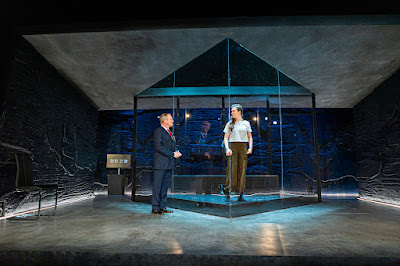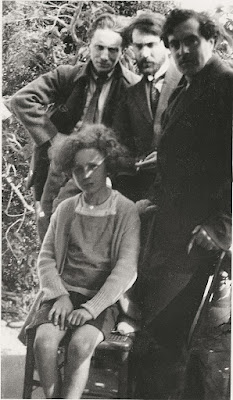X’ntigone (‘Antigone’ by Sophocles in a new version by Darren Murphy at the Mac on the fourth of February 2022)
X’ntigone (Antigone by Sophocles in
a new version by Darren Murphy at the Mac on the fourth of February 2022)
The need for theatre was evident on a cold
Friday evening in February when a full house sat down to watch Darren Murphy’s
new version of Sophocles’s play Antigone. Since we have been living through a pandemic
the play does not shy away from connecting its subject matter to contemporary
events. The city of Thebes is engulfed
in plague when Sophocles’s trilogy begins.
Oedipus has gone against nature, violated social taboos of patricide and
incest, it is implied, and only his expulsion from Thebes will return the city
to normality.
Sophocles fashioned the story of Oedipus
from myth. Oedipus was the son of Laius,
who was in turn a descendent of Cadmus, the founder of Thebes. Cadmus founded Thebes by killing a dragon,
sewing its teeth, and thereby creating a race of men, the Spartoi, who
helped him to build the city. Thebes’
acropolis, the Cadmeia, was named in honour of Cadmus. The ancient Greeks regarded Thebes as
antique and mythic, even by Greek standards.
For the Athenian dramatic poets Thebes was an obvious location for the
theatre just as Verona or Venice were places where poetry and legend mingled
for Shakespeare. The contrast
Thebes/Athens is pursued in the play too.
Although Antigone ought to be the
last play in the Theban trilogy, it was in fact the first to be written, some
years before Athens came to be embroiled in a war with Sparta. Creon, a character who appears in all three
plays, and therefore unifies the three texts, is portrayed in different lights
throughout. By the time Sophocles’s
wrote Oedipus Tyrannos, Pericles, leader of the Athenian democracy, had
made his famous funeral speech depicting the duties of a citizen in the service
of a city state like Athens. The final
play Oedipus at Colonus was written when Sophocles was an old man, just
before Athen’s final defeat in the Peloponnesian war.
There have been many versions of Antigone. The Victorians considered Antigone to
be irrelevant. Their smug belief in
progress meant that they saw the descent into barbarism (another key trope in
the play) depicted in Antigone as impossible. Some of the most famous versions were written
in the 20th century, firstly a version by Jean Anouilh, produced
before the fall of Paris to the Allies in 1944.
The play deals with the exposure of corpses of resistance fighters by
the Gestapo and the French fascist militia.
Anouilh was able to get the play produced because he contrasted the
responsibilities of the occupiers with the actions, irrational and chaotic, of
the resistance. Bertolt Brecht also
produced a version, set in an air raid shelter in Berlin in the last gasp weeks
of the war. Brecht’s version takes a
much more defiantly anti-Nazi stand.
The play is a minimalist representation of
Sophocles’s original play with only two actors on stage, Antigone and Creon
played by Eloise Stevenson and Michael James Ford. The play has a running time of just over an hour.
Sophocles utilised a chorus in his plays, but this is absent, hence there is no
commentary to contextualise or provide irony.
Instead, the audience must decipher the context and dramatic irony from
the context that Creon and Antigone provide.
Presumably this can be explained with reference to the difficulties of
creating large scale presentations under the limitations of social distancing
and mask wearing. In fact, Antigone (or
X’ntigone as she calls herself) is quarantined within a glass cubicle throughout
the play. The mise en scene is
minimal, a carbon black wall, a glass cubicle.
Canned applause prefaces the play followed by white noise like the sound
of aeroplanes landing or the thrum of distant trains then silence.
The city of Thebes is gripped by a
pandemic, but a vaccine has been found.
In fact, Antigone’s brother Eteocles, a hero according to Creon, has
quarrelled with his brother Polynices.
Polynices leaves Thebes, gathers an army, and returns to fight his
brother for the throne of Thebes. Both
brothers are killed in the ensuing conflict.
In this version, the battle is depicted as insurgents carrying ampoules
filled with a concentrated form of the virus who intend to break the ampoules
and spread the virus everywhere. One of
the insurgents is Haemon, Creon’s son who is betrothed to Antigone. He is disgusted at Creon’s treatment of
Polynices’s corpse.
Creon, Antigone’s uncle, has become King
of Thebes. Creon favours Eteocles claim
to the throne and therefore refuses to acknowledge Polynice’s right to a
burial, but Antigone buries her brother anyway.
In this version Eteocles is a qualified virologist who develops a
brand-new vaccine that defeats the virus.
Polynices is presented by Creon as either insane or a terrorist,
threatening to spread the virus to satisfy his political ends. The play deals in anachronism and attempts to
blend our contemporary situation with myth.
Creon is a hard-nosed politician who bases
everything he sees on the most pragmatic solution available. He is clearly meant to stand for Boris
Johnson. Creon trundles out the
establishment line on the pandemic, but Antigone sees him as a profiteer,
finding contracts for the big pharmaceutical company that he represents and for
his cronies who are given the contract to develop a Track & Trace App. Like Johnson, Creon has had the virus too and
only just managed to survive.
Creon/Johnson refuses to acknowledge social norms such as offering the
dead proper burial rites. He represents
the state-sponsored view of Antigone’s brother, Polynices. Antigone stands for tradition and propriety,
for the unwritten laws given to the Greeks by their gods, that dictate that
funeral rites are essential notwithstanding the actions of the deceased. The conflict between families, representing
older, aristocratic interests (members of these families were often priests)
and the duties of a citizen in a democratic city state like Athens, were potent
themes recognised by all Athenians and summed up in Pericles’s speech. Creon, like Johnson, is willing to use any
populist meme, including Lionel Richie, to restore flagging confidence in his
leadership:
Creon Was I supposed to just let him? He deliberately
infected himself. I know we have our
differences, but it’s not about us anymore, Antigone. It’s way bigger than that. This is about restoring confidence, kick
starting things again. Getting the
economy moving. It’s about showing
people we’ve beaten this thing. A few
simple words. He wasn’t in his right
mind. He was disturbed. He –
X’ntigone He wasn’t
disturbed.
Creon I’m giving us both an out here, niece.
Polynices, my Minister of Health, one of my most trusted colleagues, doing
that? My own nephew? The position that put me in? But look, the announcement’s in an hour,
they’re putting together a press kit.
We’ll play your clip distancing yourself from your brother’s actions,
along with the stats showing a drop in cases.
Freedom Day, Antigone. When we
tell them the nightmare is over. Let’s
put this behind us and move on. Imagine:
the lifting of restrictions, fireworks, DJs spinning, the Festival of
Liberty. Kadmus Avenue, ablaze with
life. We need all this. All of us.
Hearts and minds, Antigone.
That’s what it’s all about now. (Chuckles) Lionel Ritchie.
The language of the play is simple and
direct, combining the specific local and mythological references of the
original with the language of modernity, of the internet, the pandemic,
treating the pandemic as if it is a kind of invasion or insurgency. Eloise Stevenson makes a committed Antigone,
who portrays the character’s anger, elation, and despair. Michael James Ford portrays a plausible Creon
who is smarmy, manipulative, and cheap, a political fanatic devoted to the
state’s abstract duties which are devoid of humanity.
Creon attempts to depict Antigone’s
personal rebellion in terms of the memes of PCness, for instance changing her
name to X’ntigone is depicted by him as ‘gender fluid stuff’. But Antigone retorts:
X’ntigone I’m changing my legacy.
She goes on to add that ‘x is the symbol
for the first unknown variable in an algebraic sequence….From the Persian for
thing. This unknown thing plus
this unknown thing is a new thing: algebra. Also Persian: the reconciliation of disparate
parts.’ Of course, for Creon it is just
the bloody Persians again.
The economy is on the verge of ruin and
Creon wants Antigone to tell him the names of the insurgents. Creon has already turned to the prophet
Tiresias, ‘I begged Tiresias for advice, but he answered in riddles as usual.’ In the original Tiresias is a character in
the play who warns Creon that the gods have conveyed a message through a burnt
sacrifice that Polynices must be properly buried, and Antigone spared,
otherwise the gods will punish Creon.
Creon lividly outlines the political realities of his actions:
Creon Sometimes the man
in charge must make a brutal decision that leaves no room for doubt. To stop all those disaster junkies on
Instagram, and tin foil hat clowns taking selfies….It was an executive
emergency action. You must
understand that?
Antigone insists that killing Polynices
was not enough, the conflict is about ideas which the state cannot kill but
must persist beyond the destruction of individuals.
X’ntigone You can’t inoculate an idea, uncle. You’re not worried I have the
virus. You’re worried I am the
virus.
Antigone reveals to Creon that she is at
the centre of the insurgency, having used the password that he gave her to
orchestrate the attack. (He also gave
Tiresias a smart phone even though he is blind.) Antigone depicts the nature and extent of the
consequences of the insurgency, if or when it is successful, but then delves
into family history. This time its
Laius, Oedipus’s father, who raped Chrysippus who then killed himself. Oedipus was therefore a vindicated revenger,
not a parricide, but Antigone is Oedipus’s daughter and sister. Finally, Creon states:
Creon Actions
have consequences, there are victims on all sides. It’s never clean.
The conflict between the two characters is
summed up:
X’ntigone My home is my family.
Creon Your home is your country.
And what a family it is! The original
crime family, complete with parricides, rapists, incestuous beds, riddling
sphinxes and autocratic tyrants.
The dialogue between the collective good
and the interests of families and individuals is summarised by Antigone:
X’ntigone The great lie you peddle about the
collective good versus the selfishness of individuals when it is always your
own self you think of. You don’t believe
in collectivist action, you believe in mobs.
This returns us to one of the debates
within Athenian democracy between aristocratic families and popular orators or
demagogues, as they were sometimes perceived.
When one of these orators became too powerful, they could be exiled by
casting of potshards or ostracons.
Antigone repeats her belief in compassion by repeating words that former
Prime Minister Margaret Thatcher once made infamous:
X’ntigone You atomised our rage and said there
was no such thing as society, just singularity and convergence.
Creon, it seems, stands for various
British Conservative leaders. However,
Creon is not deceived by official histories:
Creon You think I don’t know some of those
men we celebrate in bronze or stone were cowards, philanderers, rapists,
thieves? That I’m unaware of this
fact? We celebrate their deeds, not
their character.
Creon then returns to Oedipus, a criminal,
a weakling, and a coward who indulged in ‘gesture politics’.
In Sophocles’s version, Creon hears
Tiresias’s predictions and seeks to free Antigone from the tomb where she is to
be buried alive, but he is too late.
Antigone has hung herself. In
Darren Murphy’s version, X’ntigone courageously faces death, bites on an
ampoule of virus that Creon has given her and refuses the antidote.





Comments